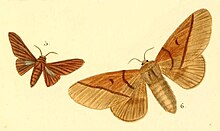Borocera madagascariensis
| Borocera madagascariensis | |
|---|---|

| |
| Scientific classification | |
| Domain: | Eukaryota |
| Kingdom: | Animalia |
| Phylum: | Arthropoda |
| Class: | Insecta |
| Order: | Lepidoptera |
| Family: | Lasiocampidae |
| Genus: | Borocera |
| Species: | B. madagascariensis |
| Binomial name | |
| Borocera madagascariensis Boisduval, 1833 | |
| Synonyms[1] | |
|
Borocera bibindandy Camboué, 1886 | |
Borocera madagascariensis is a species of lasiocampid moth endemic to coastal Madagascar. It is one of three species of silk producing moths found on the island of Madagascar.[2] B. madagascariensis is often confused with the similar Borocera cajani, which is distributed throughout the island and whose silk is more widely used for silk production. Many publications erroneously refer to B. cajani as B. madagascariensis.[3] It shares the common name of landibe with B. cajani.[4] The pupae of B. madagascariensis is consumed by the people of Madagascar, and is known in Malagasy as soherina.
B. madagascariensis feeds on Cajanus cajan, Eugenia, Manihot esculenta, Prunus persica, Psidium guajava, and Uapaca bojeri.[1]
References
- ^ a b "Borocera madagascariensis Boisduval, 1833". African Moths. Retrieved 27 May 2021.
- ^ "Native Silk Moth project in Tapia Woodland". EnviroReach. 23 November 2014. Retrieved 27 May 2021.
- ^ Razafimanantsoa, Tsiresy M.; Rajoelison, Gabrielle; Ramamonjisoa, Bruno; Raminosoa, Noromalala; Poncelet, Marc; Bogaert, Jan; Haubruge, Éric; J. Verheggen, François (2012-01-01). "Silk moths in Madagascar: A review of the biology, uses, and challenges related to Borocera cajani (Vinson, 1863) (Lepidoptera: Lasiocampidae)". BASE. 16 (2): 269–276. Retrieved 27 May 2021.
- ^ Dürr, J.; Andriamazaoro, H.; Nischalke, S.; Preteseille, N.; Rabenjanahary, A.; Randrianarison, N.; Ratompoarison, C.; Razafindrakotomamonjy, A.; Straub, P.; Wagler, I. (2020-03-01). ""It is edible, so we eat it": Insect supply and consumption in the central highlands of Madagascar". International Journal of Tropical Insect Science. 40: 167–179. doi:10.1007/s42690-019-00067-w. S2CID 209564823. Retrieved 27 May 2021.
